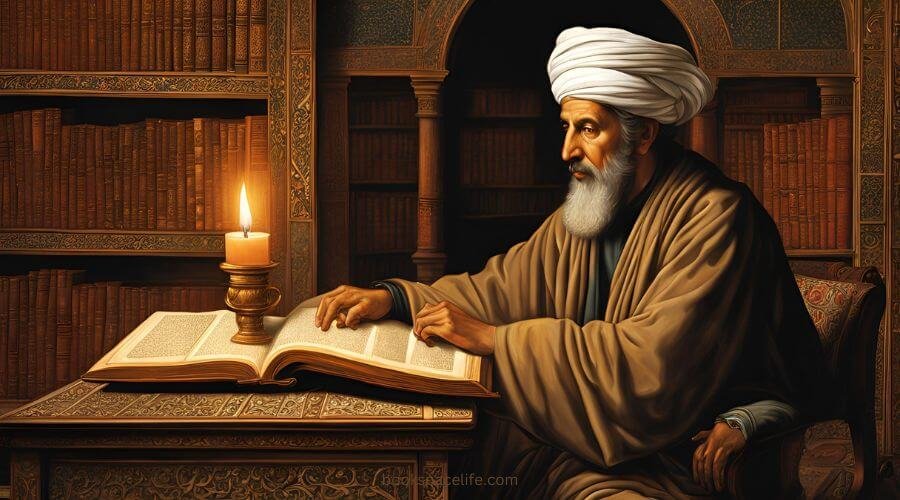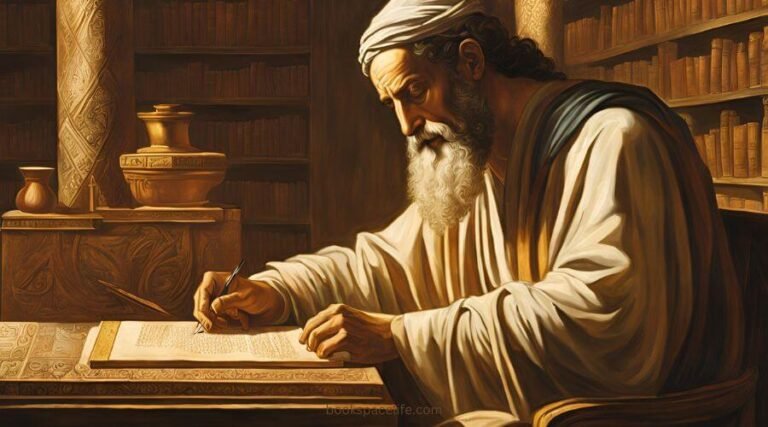Philo of Alexandria
Ibn Khaldun : The Father of Sociology and the Philosopher of History
Ibn Khaldun (1332–1406 CE) is considered one of the most important philosophers of the medieval Islamic world. His profound contributions to philosophy, sociology, history, and economics have earned him a unique place in the history of intellectual thought.
Often regarded as the father of sociology, Ibn Khaldun’s groundbreaking work in the Muqaddimah (Prolegomena), a detailed introduction to his history of the world, laid the foundation for many modern disciplines.
His ideas on the cyclical nature of history, the development of societies, and the role of economics in political power continue to influence scholars today.
Born in Tunis, in present-day Tunisia, Ibn Khaldun was a product of his time: a time of great political and intellectual turmoil in the Islamic world.
His philosophy was deeply rooted in both his observations of the world around him and the intellectual traditions that shaped his education.
His life, rich in travel and political service, deeply informed his work, and his legacy continues to resonate across a wide array of academic disciplines.
Table of Contents
(1) Early Life and Education
Ibn Khaldun was born on May 27, 1332, in Tunis, a thriving cultural and intellectual center in the heart of the Islamic world.
His family was of Andalusian origin, having migrated from Spain after the Christian Reconquista in the 13th century.
His father, a prominent scholar and public servant, played a critical role in his early education. Ibn Khaldun was introduced to the classical Islamic sciences early on, including Islamic law, theology, grammar, rhetoric, and philosophy.
He attended the University of Zaytuna in Tunis, where he studied under the tutelage of renowned scholars of the time.
His education was rooted in the traditional Islamic curriculum, which focused on the transmission of knowledge through classical texts.
However, Ibn Khaldun’s intellect and curiosity led him to explore a wide range of subjects, beyond the confines of religious studies. He was particularly interested in the emerging fields of history and sociology, and it was during these early years of study that he began to form the foundations of his own philosophical outlook.
(2) Early Career, Travels, and Political Engagement
Ibn Khaldun’s life was marked by extensive travel and political involvement, which significantly influenced his philosophical and sociological ideas.
His career began in the service of various rulers and states across the Maghreb (Northwest Africa).
He worked as a diplomat, judge, and advisor, navigating the complexities of political power and statecraft in a world marked by instability and shifting allegiances.
In his twenties, Ibn Khaldun entered into the service of the Hafsid dynasty in Tunis but was soon caught up in the political upheavals of the region.
After facing political exile and imprisonment, Ibn Khaldun’s travels took him across the Islamic world, from Algeria to Egypt, and beyond.
His time in Cairo, where he spent several years as a teacher and scholar, was particularly formative in his intellectual development.
During his travels, Ibn Khaldun interacted with scholars from various parts of the Islamic world, learning from a wide range of intellectual traditions.
His exposure to Persian, Arab, and Berber cultures gave him a unique perspective on history, society, and human development, and he began to develop his distinctive views on the dynamics of civilizations.
(3) Philosophy and Sociology: Ibn Khaldun’s Revolutionary Ideas
Ibn Khaldun’s most significant contribution to intellectual history is his development of a theory of history and society.
His philosophy of history, as articulated in the Muqaddimah, provides a sweeping analysis of the rise and fall of civilizations.
In this monumental work, Ibn Khaldun argued that the study of history should not merely be a chronicle of events but should seek to uncover the underlying causes of those events.
(i) Asabiyyah: The Social Cohesion That Binds Societies
One of Ibn Khaldun’s most important concepts is asabiyyah, often translated as “social cohesion” or “group solidarity.”
For Ibn Khaldun, asabiyyah was the essential force that allowed societies to come into being, rise to power, and eventually collapse.
He theorized that tribal or family solidarity is what enables a group to achieve political power and establish a state.
This bond, forged through mutual support and collective identity, was the foundation of all human society, from the smallest tribal group to the largest empire.
Asabiyyah, according to Ibn Khaldun, is strongest in the early stages of a society’s formation and plays a critical role in the establishment of dynasties and empires.
However, as a society grows more powerful, its asabiyyah gradually weakens. The rulers of powerful states become detached from the common people, and corruption begins to take hold.
The decline of asabiyyah, Ibn Khaldun argued, leads to the downfall of civilizations, with dynasties and empires falling prey to internal strife, external threats, and corruption.
(ii) The Cyclical View of History
Building on his theory of asabiyyah, Ibn Khaldun proposed a cyclical theory of history.
He argued that societies go through predictable stages: from the initial period of tribal solidarity and growth, to a stage of decay and decline.
This cycle, according to Ibn Khaldun, is driven by social cohesion and its eventual weakening.
As the strength of asabiyyah diminishes, the elite rulers become increasingly disconnected from the people, and the empire or state begins to fragment and collapse.
Ibn Khaldun’s cyclical view of history contrasts sharply with the linear views of history that dominated much of medieval thought, including that of many Christian philosophers.
His analysis of the dynamics of power and society was groundbreaking, offering an early understanding of sociology and the role of social structures in shaping historical events.
(iii) Economic and Political Philosophy
In addition to his theories on society and history, Ibn Khaldun also made significant contributions to economics and political philosophy.
He believed that the economic foundation of a society was integral to its political stability.
Labor, according to Ibn Khaldun, was the primary source of wealth, and the state’s role was to regulate and support economic activity through fair taxation and the protection of trade.
Ibn Khaldun was one of the earliest thinkers to identify the relationship between economic prosperity and political stability, a theme that would later be explored more fully by modern economists.
He also emphasized the importance of justice and good governance in maintaining the stability of the state.
For Ibn Khaldun, political leaders were responsible for maintaining the social order and ensuring that the needs of the people were met.
However, he also recognized that political power could easily become corrupt, and he cautioned rulers against tyranny and the abuse of power.
(4) Influence and Impact
Ibn Khaldun’s work was highly influential in the Islamic world, where it shaped subsequent developments in history writing, sociology, and economics.
His ideas about asabiyyah and the cyclical nature of history had a profound impact on later Islamic historians and philosophers, and his work continued to be studied and respected well into the Ottoman period.
In addition to his influence within the Islamic world, Ibn Khaldun’s ideas had a profound impact on Western thought.
Although his work was largely neglected in Europe during the medieval period, it was rediscovered during the Renaissance and became known to European intellectuals through translations and references in the writings of Montesquieu and Voltaire.
His cyclical view of history and his analysis of social dynamics influenced the development of modern sociology and historical materialism in Europe, with thinkers like Karl Marx and Max Weber drawing on his insights.
Ibn Khaldun’s approach to economic theory also laid the groundwork for later developments in the field.
His recognition of the importance of labor, production, and trade in the development of wealth was ahead of its time and foreshadowed later economic theories that would emerge during the Enlightenment and beyond.
(5) Legacy
Ibn Khaldun’s influence extends far beyond his lifetime, and his ideas continue to shape a wide range of academic fields.
His interdisciplinary approach to understanding human society and history has earned him a place as one of the most important intellectual figures of the medieval world.
As the father of sociology and a pioneer in the fields of economics, history, and political theory, Ibn Khaldun remains a figure of immense intellectual significance.
His work continues to be studied and appreciated by scholars in both the Islamic and Western traditions, solidifying his legacy as one of the greatest thinkers in world history.
In conclusion, Ibn Khaldun’s life and work offer a fascinating glimpse into the intellectual currents of the medieval Islamic world and their enduring influence on modern thought.
As a philosopher, historian, and social theorist, he laid the foundation for many of the academic disciplines we study today.
His insights into the dynamics of societies, the role of economics in political stability, and the cyclical nature of history continue to resonate, making Ibn Khaldun one of the most significant and forward-thinking scholars in the history of philosophy and social science.








